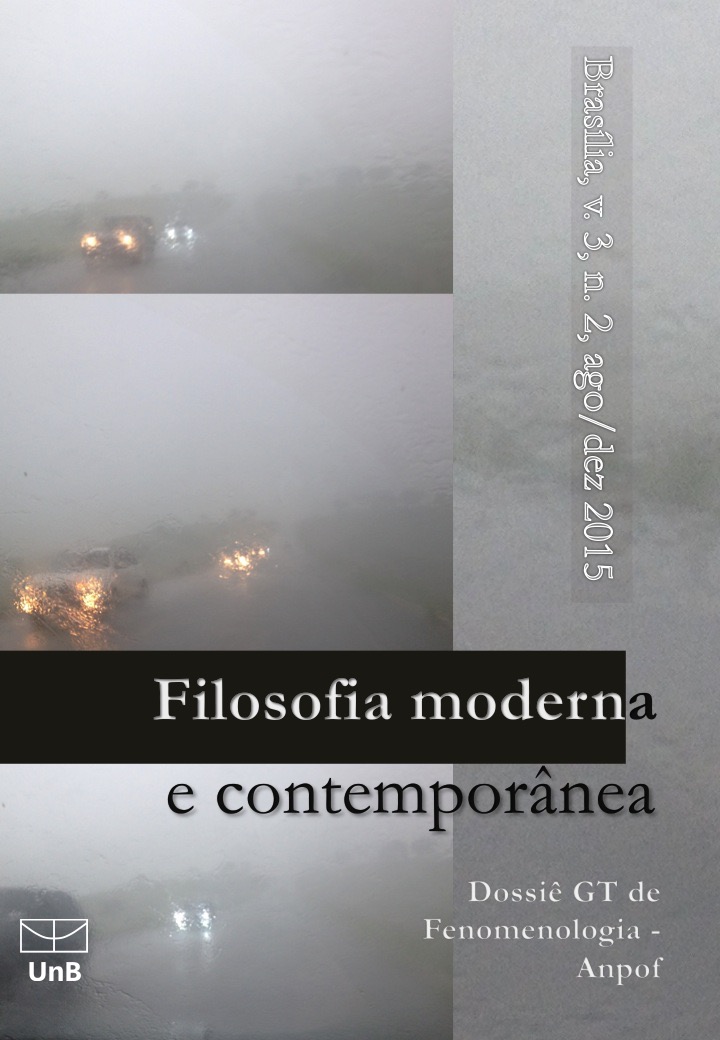Belief and reason in Husserl’s phenomenology
DOI:
https://doi.org/10.26512/rfmc.v3i2.12510Keywords:
Belief, Reason, Teleology, BeingAbstract
In a present paper I analyze a concept of belief [Glaube] and its relation to reason in Husserl’s phenomenology. Three aspects of this relation are considered: the reason as a essence and telos of a man and its realization in the philosophical life that demands the belief in the reason; the belief as a position of being and its legitimation by reason; finally, the belief in God as a condition for anethical life and for a realization of the rational meaning of the life. The teleological concept of subjectivity and intersubjectivity reveals itself to be ofgreat importance. The concept of reason is extended, so that an original unity of theoretical and practical dimension is plausible.
Downloads
References
BRAINARD, M. Belief and its Neutralization. Husserl’s System of Phenomenology in Ideas I. New York: State University of New York Press, 2002.
HUSSERL, E. Aufsätze und Vorträge (1922-1937). (Hua XXVII). Th. Nenon, H.R. Sepp (Hrsg.). Dordrecht: Kluwer Academic Publishers, 1989. Tradução portuguesa parcial P. M. S. Alves. Europa: Crise e renovação. Rio de Janeiro: Forense universitária, 2014.
_____. Cartesianisce Meditationem und Pariser Vorträge. (Hua I). S. Strasser (Hrsg.). Haag: Martinus Nijhoff, 1973. Tradução portuguesa P. M. S. Alves. Meditações cartesianas e Conferências de Paris. R i o d e Ja n e i r o : Fo r e n s e Universitária, 2013.
_____. Die Krisis der europäischen Wissennschaften und die transzendentale Phänomenologie. (Hua VI). M. Biemel (Hrsg.). Haag: Martinus Nijhoff, 1954. Tradução portuguesa D. F. Ferrer. A crise das ciências europeias e a fenomenologia transcendental: uma introdução à filosofia fenomenológica. Rio de Janeiro: Forense Universitária, 2012.
_____. Erfarhung und Urteil. Untersuchungen zur Genealogie der Logik. L. Landgrebe (Hrsg.). Prag: Academia Verlagsbuchhandlung, 1939.
_____. Erste Philosophie (1923/4).Zweiter Teil: Theorie der phänomenologischen Reduktion (Husserliana VIII). R. Boehm (Hrsg.). The Hague: Martinus Nijhoff, 1959.
_____. Grenzprobleme der Phänomenologie. Analysen des Unbewusstseins und der Instinkte. Metaphysik. Späte Ethik. Texte aus dem Nachlass (1908”“1937). (Hua XLII) R. Sowa und Th. Vongehr (Hrsg.). Dordrecht: Springer, 2013
_____. Ideen zu einer reinen Phänomenologie und phänomenologischen Philosophie. Erstes Buch:Allgemeine Einführung in die reine Phänomenologie. (Hua III) Haag: Martinus Nijhoff, 1952. Tradução portuguesa M. Suzuki. Ideias para uma fenomenologia pura e para uma filosofia f e n o m e n o l ó g i c a : i n t r o d u ç ã o g e r a l à fenomenologia pura. Aparecida, SP: Ideias & Letras, 2006.
_____. Phantasie, Bildbewusstsein, Erinnerung. Zur Phänomenologie der anschaulichen Vergegenwärtigungen. Texte aus dem Nachlass (1898-1925). (Hua XXIII) E. Marbach (Hrsg.). The Hague: Martinus Nijhoff, 1980.
_____. Vorlesungen über Ethik und Wertlehre.1908-1914 (Hua XXVIII). U. Melle (Hrsg.). The Hague, Netherlands: Kluwer Academic Publishers, 1988.
LANDGREBE, L. Der Weg der P h ä n o m e n o l og i e . D a s P r o bl e m e i n e r einsprünglichen Erfahrung. Gütersloh: Gutersloher Verlagshaus Gerd Mohn, 1963.
NI, L. Seinsglaube in der Phänomenologie Edmund Husserls. Dordrecht: Kluwer Academic Publishers, 1999.
Downloads
Published
How to Cite
Issue
Section
License
Copyright for articles published in this journal is retained by the authors, with first publication rights granted to the journal. By virtue of their appearance in this open access journal, articles are free to use, with proper attribution, in educational and other non-commercial settings.


